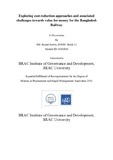Exploring cost reduction approaches and associated challenges towards value for money for the Bangladesh Railway

View/
Date
2016-09Publisher
BARC UniversityAuthor
Karim, Md. RezaulMetadata
Show full item recordAbstract
Bangladesh Railway is the state-owned rail transport agency of Bangladesh. It operates and maintains the entire railway network of the country. BR is controlled by the Directorate General of Bangladesh Railway under the Ministry of Railway. The vision of BR is to provide safe, reliable, cost-effective, and time-efficient rail transport service in the country through modernizing, expanding, & maintaining rail system in a manner which supports government strategies for economic, social, & environmental development. Transportation sector in general and Bangladesh Railway (BR) in particular, has always played a vital role in the economic growth and development of Bangladesh by hauling both goods and passengers. However, BR has been facing formidable challenges from alternative modes of transport during the past decades. BR is losing its share, both in absolute and relative terms, to a fast growing road sector. This loss of share can largely be attributed to a well planned and well developed road network that began expanding since the eighties. The road transportation is mostly privately managed and is more efficiently operated relative to BR. The latter has been a publicly funded and managed organization. Railway is known to have competitive advantage in bulk goods and long haul due to cost effectiveness and safety issues. However, BR has failed to meet the standards due to institutional shortcomings and physical bottlenecks. Today BR is in frail health with obvious symptoms of further decline in its performance. An in-depth academic investigation to identify some weaknesses of can help formulate appropriate policy measures for improvement of the sector. Besides providing transportation services, railway is also a major employer of civilian labor force. The current level of employment in this sector exceeds 40,000 employees. BR should be capable of providing optimal services and help economic growth by ensuring a smooth flow of goods, e.g., food, raw material, industrial and agricultural inputs, exports etc. With its net operating income in the red, the problems seem to demand a higher degree of attention, as the sector continues to claim a larger share on the limited resources. The Railway receives a sizeable subsidy from the public exchequer, despite the well-documented evidence that subsidy promotes inefficiency. The onus must be on the railway to play a socially desirable role. From policy considerations, it is important that the sector runs efficiently, remains economically viable, and makes significant contribution to growth of the economy. From that perspective, research on the performance of this sector, is long overdue. One way of
iv
improving efficiency and ensuring value of public money is to reduce the operating cost. This
research is an effort to explore the cost reduction approaches and opportunities in Bangladesh
Railway, in the light of procurement and supply chain management.
